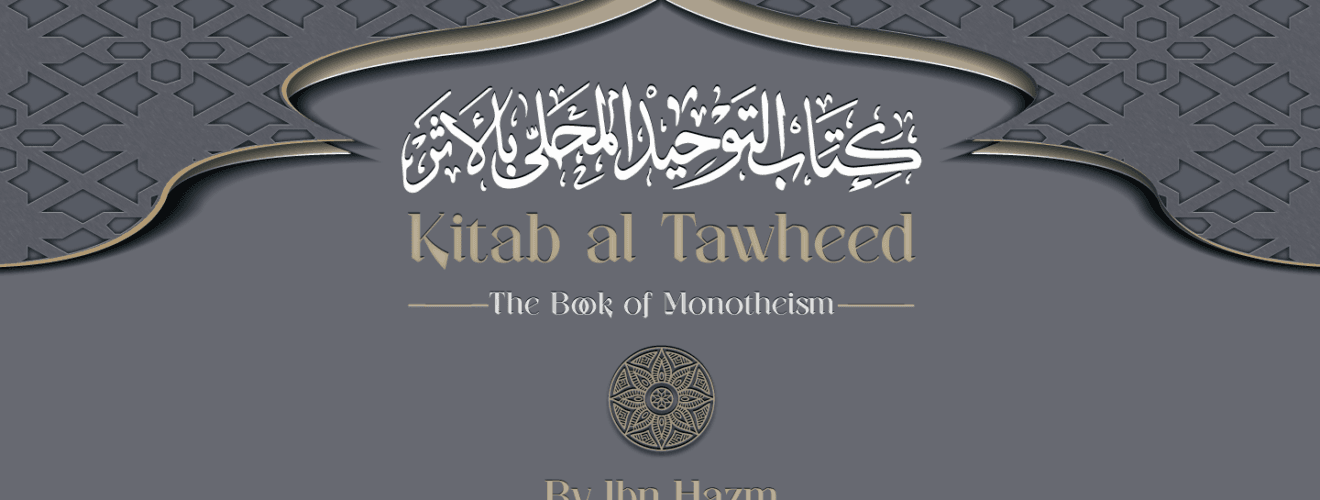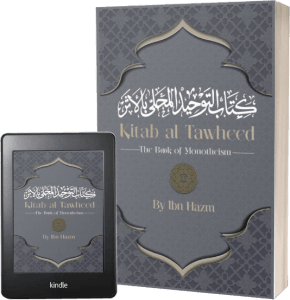The Book of Tawheed (al-Muhalla)

Getting your Trinity Audio player ready...
|
Presented here for the first time in English, is a complete translation of book one entitled Kitab al-Tawheed (the Book of Monotheism) taken from Ibn Hazm’s magnum opus of fiqh (jurisprudence), al-Muḥalla bil’Athār.[1] Given that we have already translated book two from al-Muḥalla, Masā’il min al-Uṣul’ (issues or enquiries from Uṣul) appearing in English now as ‘Foundational Islamic Principles,’ it seems prudent to complete the opening book from this seminal work too.
With regards to the nature of the topic and the definition itself, in Arabic, the word ‘Tawḥeed’ (monotheism) is a verbal noun that is derived from the word ‘Waḥada’, carrying the meaning with emphasis, to be alone, singular.[2] That word itself frequently appears in the texts of revelation, in both the Qur’ān and the Prophetic Sunnah, notably:
وإذا ذكرت ربك في القرآن وحده ولوا على أدبارهم نفورا
When you mention your Lord in the Qur’ān, and Him alone, they turn their backs and run away.[3]
وإذا ذكر الله وحده اشمأزت قلوب الذين لا يؤمنون بالآخرة وإذا ذكر الذين من دونه إذا هم يستبشرون
Whenever Allah is mentioned on His own, the hearts of those who do not believe in the hereafter shrink with aversion, but they rejoice when gods other than Him are mentioned.[4]
ذلكم بأنه إذا دعي الله وحده كفرتم وإن يشرك به تؤمنوا فالحكم لله العلي الكبير
[They will be told], ‘This is all because when Allah alone was invoked you rejected this, yet when others were associated with Him you believed [in them].’ Judgement belongs to Allah the Most High, the Most Great.[5]
With regards to the Prophetic Sunnah, use of the word appears expressed in the famous ḥadith narrated from Ṭāriq ibn Ashyam:
حدثنا يزيد بن هارون قال أخبرنا أبو مالك الاشجعي عن أبيه أنه سمع النبي صلی الله علیه وسلم وهو يقول لقوم من وحّد الله تعالى وكفر بما يعبد من دونه، حرُمَ ماله ودمه، وحسابه على الله عز وجل
Yazid ibn Hārun narrated to us he said Abu Mālik al-Ashja’ee reported to us from his father that he heard the Prophet peace and blessings be upon him say to the people: Whoever confesses to the oneness of Allah the Exalted and disbelieves in what is worshipped besides Him, his wealth and blood will be sanctified, and his reckoning will be with Allah, the Majestic and Sublime.[6]
There is no multiplicity of ‘gods,’ nor any pantheon, there is only Allah. And He, the Exalted and Majestic, has no partner, no consort and no offspring – whether that be falsely attributed to Him by the people of the book, who say that Jesus is the son of God, or the pre-Islamic Arabs who said that the angels were the daughters of Allah. He, the Exalted and Majestic and only He has the ultimate prerogative of command.
Most, if not all the issues that are covered in Kitāb al-Tawḥeed from al-Muḥalla should be quite straightforward, some of greater length than others. Ibn Ḥazm in his inimitable style, provides detailed evidences from the book and Sunnah to substantiate the core issue under consideration. Given the period in which Ibn Ḥazm lived, in Islamic Spain during the 11th century, the reader in English will notice that there is no attempt at seeking to categorise Tawḥeed into the ill-disciplined tripartite division of later scholars like Ibn Taymiyyah.
وَإِلَهُكُمْ إِلَهٌ وَاحِدٌ لاَّ إِلَهَ إِلاَّ هُوَ الرَّحْمَنُ الرَّحِيمُ
Your God is the one God: there is no god except Him, the Lord of Mercy, the Giver of Mercy.
Although not part of the original Arabic text, we have included accompanying footnotes, together with additional clarification where appropriate. Similar occurs for the chapter headings, which are not always strictly delineated in the original Arabic text. Each Mas’ala is presented as a standalone chapter. Rather than have a commentary or Sharḥ within the body-text, this has been included as footnotes. The bulk of that commentary is provided by our esteemed Shaykh, Professor Muḥammad ibn Abdullah al-Mas’ari. As with other translated texts, we have again utilised a single translation of the Qur’ān for the sake of consistency, that produced by Professor M Abdel Haleem.
We ask Allah for His help, support and guidance. Perhaps this small effort presented here will benefit you as well as us, in this life and the next to come, Ameen Ya Rab.
The introduction and the opening chapter are provided free below.
To purchase the paperback copy, click here.
To purchase the Kindle edition, click here.
Introduction
In the name of Allah, al-Raḥman, al-Raḥeem.
Ali ibn Aḥmad ibn Sa’eed ibn Ḥazm, may Allah be pleased with him, said:
May the highest prayers and salutations be upon Muḥammad the Seal of all the Messengers and Prophets. We ask Allah that He will accompany us with protection from every mistake and blunder and grant us correctness in every deed and statement, ameen ameen.[7]
To proceed, may Allah help us and you (to adhere) to His obedience. You have asked that we should put together a comprehensive abridgment of the issues/enquires that we compiled in our book entitled ‘al-Mujalla,’[8] with an abridged explanation thereof. Upon which we restrict ourselves only to the basic principles of evidences without going overboard or being excessive in number. (This is) so it will be easy for the beginners and students as a step-for-step guidance in becoming comprehensive in argument and knowing – but also correcting, the divergent points of view upon the various evidences which leads (one) to know the truth in areas that the people have disagreed upon. Also, it will enable one to have an overview of the rulings of the Qur’ān, to further have the majority of the well-established Sunnah from the Messenger of Allah peace and blessings be upon him, distinguishing it from what is not authentic. Moreover, taking note of the thiqāt (trustworthy narrators) from riwayāt al-akhbār (channels of reports), distinguishing them from others. Providing a warning about the corruption of what is qiyās (analogy), the contradictions that it necessarily produces and the contradictions of those who utilise it find themselves in, all thanks to Allah the Mighty and Sublime for this endeavour. I ask the Exalted to guide my mind to this task, asking His help in the guidance towards the truth and His support to explain that and make it clear; that (this endeavour) will be exclusively for His sake, ameen, Rab-al-‘Aālameen (Lord of all Creation).
Let it be known to whoever reads our book that we did not argue upon the basis of a khabr (report) except with that which is Ṣaḥīḥ (authentic beyond reasonable doubt) from musnad (connected) riwayāt (channels of transmission) by the thiqāt. We did not dispute with a khabr unless it has been ḍaef (weak) and we have demonstrated it to be as such, or that it is mansukh (abrogated) and have shown its naskh (abrogation).
Our guidance and support is only from Allah the Exalted.
The Testimony
Abu Muḥammad (Ibn Ḥazm) may Allah be pleased with him said: The first matter which is required of everyone, (that) one’s Islam is not valid without it, is that a person knows with certitude and sincerity in his heart – with doubt having no effect, and he declares the matter by speaking it with his tongue – is that there is no god except Allah, and that Muḥammad is the Messenger of Allah.[9] Concerning the proof for that, it is (taken from) what has been narrated:
ما حدثناه عبد الله بن يوسف نا أحمد بن فتح نا عبد الوهاب بن عيسى نا أحمد بن محمد نا أحمد بن علي نا مسلم بن الحجاج نا أمية بن بسطام نا يزيد بن زريع نا روح عن العلاء بن عبد الرحمن بن يعقوب عن أبيه عن أبي هريرة عن رسول الله صلى الله عليه وسلم قال أمرت أن أقاتل الناس حتى يشهدوا أن لا إله إلا الله ويؤمنوا بي وبما جئت به، فإذا فعلوا ذلك عصموا مني دماءهم وأموالهم إلا بحقها وحسابهم على الله
Abdullah ibn Yusuf narrated it to us Aḥmad ibn Fatḥ narrated to us ‘Abd-al-Wāhab ibn Esa narrated to us Aḥmad ibn Muḥammad narrated to us Aḥmad ibn Ali narrated to us Muslim ibn al-Ḥajjāj narrated to us Umaya ibn Bisṭām narrated to us Yazeed ibn Zureeyh narrated to us Rawḥ narrated to us from al-Alā’ ibn Abdar-Raḥman ibn Ya’qub from his father from Abu Hurayrah, from the Messenger of Allah, peace and blessings be upon him, he said: I have been commanded to fight the people until they testify that there is no god but Allah, and believe in me (that) I am the Messenger and in all that I have brought. And when they do that, their blood and wealth are guaranteed protection on my behalf except where it is justified by law, and their account rests with Allah.[10]
Indeed, the meaning of this has been reported, musnad (connected) by way of Mu’ādth (ibn Jabal), Ibn ‘Abbās and many others besides them. Allah the Exalted has said:
ومن يبتغ غير الإسلام دينا فلن يقبل منه وهو في الآخرة من الخاسرين
If anyone seeks a religion other than Islam it will not be accepted from him: he will be one of the losers in the hereafter.[11]
It is the saying of all the Ṣaḥāba (Companions of the Prophet) and all the people of Islam. As for the obligation to retain that firmly with the heart, it is as said by Allah the Exalted:
وما أمروا إلا ليعبدوا الله مخلصين له الدين
Though all they are ordered to do is worship Allah alone, sincerely devoting their Deen to Him.[12]
Al-Ikhlāṣ (devotional sincerity) is an act of the nafs. Regarding the obligation to declare (the testimony) with the tongue, it is that testimonial declaration which lifts blood and wealth from being permitted to being unlawful. As the Messenger of Allah, peace and blessings be upon him said, it is with the tongue, by necessity.
Endnotes
[1] al-Muḥalla bil’Athār, [Vol. 1, pp. 21/71].
[2] Together with the cited evidences, the definition is taken from Kitāb al-Tawḥeed by our esteemed Shaykh, Professor Muḥammad ibn Abdullah al-Mas’ari.
[3] Qur’ān, 17: 46
[4] Qur’ān, 39: 45
[5] Qur’ān, 40: 12
[6] The narration / wording is taken from Musnad Aḥmad [Musnad al–Makkieen, ḥadith of Ṭāriq ibn Ashyam al-Ashja’ee Abu Mālik, no. 15,875]. In his commentary upon Musnad Aḥmad, Shu’ayb al-Arnā’uṭ said: ‘Its isnād is Ṣaḥīḥ upon the conditions of (Imām) Muslim.’ Muslim records the same in his Ṣaḥīḥ through several authentic channels in Kitāb al-‘Imān.
[7] This serves as author’s introduction to al-Muḥalla.
[8] It is interesting to note that the 12-Volume Arabic edition of al-Muḥalla that we presently have is considered, as Ibn Ḥazm says, an abridgment. The larger work of ‘al-Mujalla’ would presumably have been comparable in size to Ibn Taymiyyah’s Majmu’ al-Fatāwa’ [Compendium of legal responsa].
[9] The opening part of the testimony or declaration of faith/Islam is all too often rendered incorrectly into English as ‘there is none worthy of worship.’ While this dominates English translation, particularly the book market, strictly speaking, it is not a correct rendering. A more literal translation provides clarity on both the negation and affirmation aspects to the testimony. Moreover, the phrasing of ‘none worthy of worship,’ doesn’t categorically present a negation of there being no ‘other’ god, except Allah. ‘Your God is the one God: there is no god except Him, the Lord of Mercy, the Giver of Mercy.’ Qur’ān, 2: 163.
[10] Agreed upon, cited in most collections of ḥadith narrated via several companions. The narration and channel are from Ṣaḥīḥ Muslim, Kitāb al-‘Imān. As with all ḥadith cited, Ibn Ḥazm presents his isnād up to and including that of Imām Muslim.
[11] Qur’ān, 3: 85
[12] Qur’ān, 98: 5




